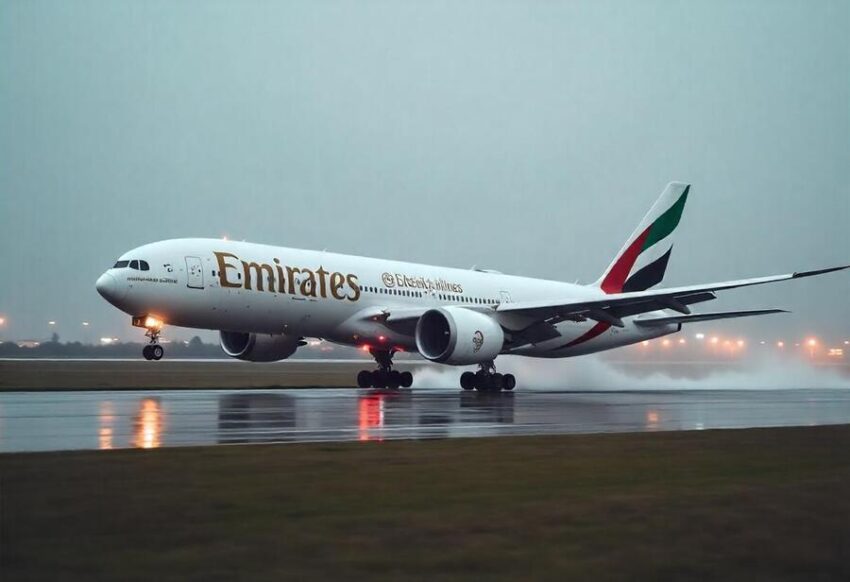Tuesday, July 1, 2025

Emirates has announced a significant shift in its aircraft deployment on the Dubai to London Gatwick route, set to commence in January 2026. This strategic move will see the airline operate three daily flights between these two major cities, with one of those services utilizing the Boeing 777-300ER. The other two flights will continue to feature the iconic Airbus A380, known for its luxury and spaciousness.
Gatwick to Continue Receiving Two Daily A380 Flights
London Gatwick has long been a hub for Emirates’ A380 operations, distinguished as one of the few airports globally to manage three daily flights with this impressive aircraft. For many years, Gatwick’s routes have been exclusively served by the A380, providing passengers with premium amenities and a greater capacity.
The upcoming change diversifies service options by introducing the Boeing 777-300ER on one of the flights. Yet, the other two services will maintain the luxurious A380, allowing Gatwick to remain one of the select international airports featuring multiple A380 arrivals each day. This indicates both the route’s ongoing popularity and its strategic importance for Emirates.
Boeing 777 Brings Versatility to Fleet Mix
The Boeing 777-300ER is renowned for its efficiency, comfort, and performance in long-haul flights. By incorporating this aircraft into the Gatwick rotation, Emirates can more effectively manage passenger capacity, particularly during peak travel seasons and fluctuating demand.
While the Boeing 777 does not possess some of the standout features of the A380—like an onboard lounge and a first-class shower spa—it still offers modern comforts such as lie-flat seats in business class, excellent inflight entertainment, and spacious cabin layouts. This aircraft transition allows Emirates to flexibly adjust to demand without sacrificing service quality.
Fleet Realignment Supports Broader Network Optimization
Emirates has a history of strategically deploying its widebody aircraft based on various factors, including demand, aircraft availability, and overall route performance. The decision to add the Boeing 777 to the Dubai-Gatwick route is in line with the airline’s broader goals of optimizing operational efficiency while ensuring premium services are upheld.
By assigning one of the A380s to other destinations with increased demand, Emirates can better allocate its resources and manage costs while maintaining robust service and connectivity to critical markets.
Continued Commitment to the UK Market
This adjustment does not indicate a reduction in service. Passengers can still expect three daily flights connecting Dubai and Gatwick, ensuring a consistent level of frequency and service availability. Emirates’ strong presence in the UK market is solidified through Gatwick’s role in catering to leisure and regional travelers from southern England.
Simultaneously, London Heathrow, another primary hub for the airline in the UK, will continue to feature multiple daily A380 flights. This dual approach secures a well-rounded offering for travelers, allowing for numerous connections across the globe to destinations in Asia, Africa, the Middle East, and beyond.
A Balanced Experience for Travelers
While some passengers may fondly recall the days of an all-A380 configuration, the experience on both aircraft types remains competitive and compelling. Travelers aboard the Boeing 777 can look forward to a full suite of inflight services, including gourmet meals, expansive entertainment options, and comfortable seating across all classes.
Business class travelers onboard the Boeing 777 benefit from direct aisle access and lie-flat seating, providing a comfortable space to work or relax. At the same time, economy class passengers will still enjoy generous legroom and quality service, all contributing to a seamless travel experience regardless of the aircraft type.
Responding to Changing Market Trends
As travel demand undergoes transformation, flexibility in fleet planning becomes paramount. The Boeing 777’s reduced seat count compared to the A380 makes it a suitable option for managing flights during slower travel periods while still maintaining frequency. This adaptability is vital for Emirates as it navigates the post-pandemic travel landscape, which is characterized by shifting consumer preferences and seasonal demand fluctuations.
In an era when airlines must respond to dynamic changes in the travel industry, Emirates’ revised service to Gatwick exemplifies a strategic approach that maximizes both value and passenger satisfaction.
«Enjoyed this post? Never miss out on future posts by following us»


